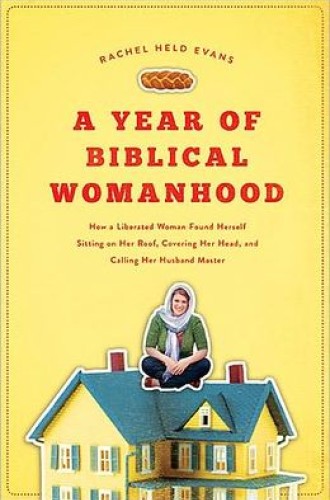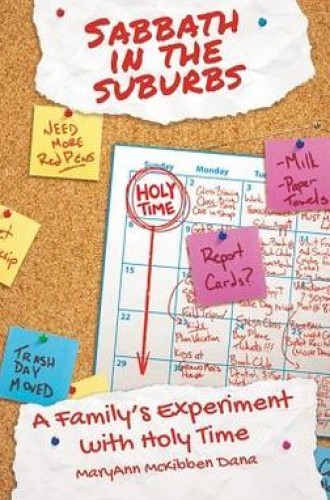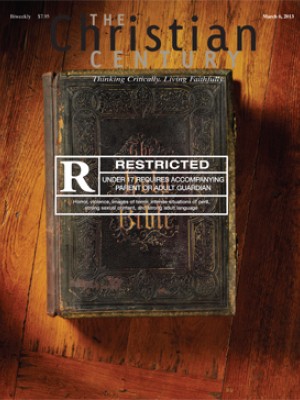A Year of Biblical Womanhood and Sabbath in the Suburbs
In a guinea pig memoir, the intrepid narrator tries on a practice for a period of time, often a year, in the hope that the project will lead to personal or prophetic insight, renewed hope for the future—and a book deal. Think Julie and Julia, The Happiness Project and the aptly named Guinea Pig Diaries, by professional guinea pig and Esquire staff writer A. J. Jacobs. Jacobs had a big hit in 2007 with The Year of Living Biblically, in which he attempted to follow a lengthy list of biblical commandments as literally as possible. And now popular evangelical blogger Rachel Held Evans has written a knockoff of Jacobs’s Year. In A Year of Biblical Womanhood, she takes aim at the inconsistencies of conservative evangelical culture and its prescriptions for the lives of “godly women.”
Evans’s book was born out of her consternation with the expectations of evangelical culture, which made her childless marriage seem incomplete and her career a useless diversion from the biblical roles she was supposed to be pursuing. She thought that she’d managed to avoid internalizing too much of the complementarian philosophy because her mother had submitted to her dad only once, in 1977, and because she and her husband had slipped into an egalitarian partnership—against their own expectations. So Evans was surprised to see her educated, liberal friends quitting their jobs to raise their kids as at-home moms and to live more fully into “biblical” marriage and domesticity.
Read our latest issue or browse back issues.
A Year of Biblical Womanhood may not have reached much past the readership of its author’s popular blog if it hadn’t been for a brief skirmish between Evans and her publisher over a flippant, nonanatomical use of the word vagina and LifeWay bookstores’ subsequent refusal to carry her book. Slate picked up the story, and Evans was featured on Oprah.com and appeared on The View. Evans stoked the fires by writing about her frustration with the frequently unstated norms of evangelical Christian publishing, suggesting that these norms are applied differently to female than to male authors. Mark Driscoll, she points out, uses colorful vocabulary in his book Real Marriage and has been widely acclaimed for his candor.
All of this, along with Evans’s frequent mention in the book itself of the journey toward publication and the advance publicity she received, suggests that this book was written to make a splash. The clarity of that intention is not altogether pleasant.
Evans begins with a hunch that all women constantly feel as though they’re not living up to someone else’s standards, and that the standards she and her peers are being held to are considered by many to be biblical. But, she contends, their use of the term biblical is limited, if not downright inaccurate.
In one of her clearest passages, Evans writes:
Now, we evangelicals have a nasty habit of throwing the word biblical around like it’s Martin Luther’s middle name. We especially like to stick it in front of other loaded words, like economics, sexuality, politics, and marriage to create the impression that God has definitive positions about such things, opinions that just so happen to correspond with our own. Despite insistent claims that we don’t “pick and choose” what parts of the Bible we take seriously, using the word biblical prescriptively like this almost always involves selectivity.
This analysis may not be groundbreaking for many Century readers, but it is bold for a writer in her early thirties to offer a claim so counter to the orthodoxy of her broad theological community.
The book is at its best when Evans is at her boldest—reading the biblical text closely and offering examples of women from both testaments who challenge the stated norms of the “biblical womanhood” movement. Her underlying hope, it seems, is that the book will redeem the Bible for her audience of mostly youngish women who long for a vision of their lives as disciples, not simply brides of disciples, though she also wants to problematize the texts, to name the ways in which the Bible is used to justify ill treatment of women.
Evans spent a year following her “ten commandments” of biblical womanhood as literally as possible, each month focusing on a different virtue: gentleness, domesticity, obedience, valor, beauty, modesty, purity, fertility, submission, charity, silence and grace. Something of a gimmick, this structure does a disservice to Evans’s argument. The practices through which she plans to exercise the 12 virtues seem arbitrary and goofy. For example, Evans addresses the Levitical purity codes by spending a night in a tent in her front yard (in homage to the novel The Red Tent more than to orthodox practice) and a week in the guest room, abstaining from all physical contact with men, including her husband. She sits out on the dancing at a wedding and misses high-fiving her husband, but she stops short of analyzing why it might be problematic for women that the most natural sign of biologically healthy womanhood is considered impure.
I expected much from Evans’s book. I enjoy her blog and have a personal interest in women’s efforts to reject restrictive religious teachings and too narrow readings of the Bible. But Evans doesn’t achieve what A. J. Jacobs did. His touch was lighter, and his insights periodically surprising and rich. A Year of Biblical Womanhood may turn out to be an important book, but its importance will derive more from the questions that Evans raises about women in Christian publishing than about women living biblically.
MaryAnn McKibben Dana’s Sabbath in the Suburbs: A Family’s Experiment with Holy Time will probably make a much smaller splash than Evans’s book even though it is one of the most helpful and well-conceived books on spirituality I’ve ever read. Lively, funny and self-aware, Dana has managed to write a guinea pig memoir that is widely accessible as well as authentic to the particularities of her family. The experiment of the title is meant to be repeated.
Dana and her husband, Robert, a software engineer, live in the fast-paced, upwardly mobile Washington, D.C., suburbs, and they feel pulled from all sides toward greater efficiency, more involvement and more activities for their three young children. But they also recall the rosy-eyed months of their first child’s infancy, when time seemed to stand still and they could spend hours doing nothing more than lovingly observing their new daughter and enjoying their new life as a family. Dana, a Presbyterian pastor, imagines that the key to recapturing that relationship to time is to discover a way to practice Sabbath.
This endeavor is harder than it sounds because Dana does not want to pilfer from Orthodox Jewish tradition, and she also doesn’t want to describe Sabbath as something unattainable for a working mother like her, as Christian writers often do: “The book covers feature a scripty font and a peaceful landscape, not sticky fingers and needling requests.” Dana notes that “caring for kids” challenges Sabbath expectations because it “becomes the gateway drug to more tasks.”
In the unfolding story of their Sabbath year, Dana and her family find ways to deepen their faith and the love they share and their awareness of the world and of the work of their own hearts. There are missteps and last gasps of type-A, workaholic tendencies, and they have to renegotiate their commitments to self and community. Dana is explicitly aware of the economics of her family’s experiment, and Robert is a much more active presence than Rachel Held Evans’s husband. Evans tells us that she has an egalitarian marriage; Dana shows us what this looks like.
Life in the Dana household is deeply attractive. Robert and MaryAnn both get good lines: he “deadpans” a lot, and she is fabulously self-deprecating in the way only competent and assured narrators can be. The children are game and full of wisdom but also demand entertainment. Each chapter provides a “Sabbath Hack,” an “inelegant but effective solution to a problem” that helps make Sabbath-keeping possible and fruitful with kids. My favorite hack is the provision of coins that the kids can spend on their allotted TV or Wii time on the Sabbath. One of Dana’s friends who grew up with strict rules about the Sabbath complained that she was violating the rules by doing commerce. The response? “I don’t care what she says. It’s a Sabbath miracle.”
Dana contends that “we can act ourselves into a different way of being.” Her family’s brilliantly narrated experiment with holy time proves her point as they grow and change together, learning to love each other and the world more fully through spiritual practice.








